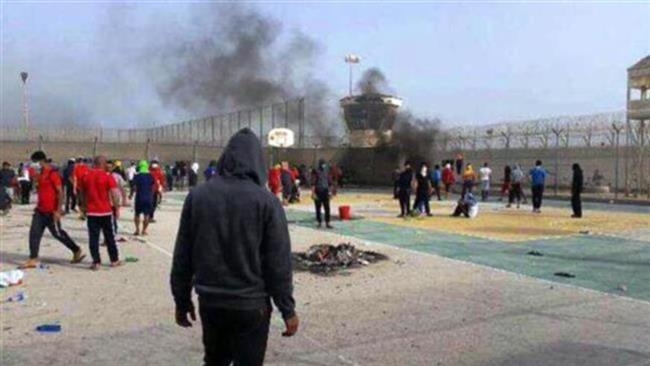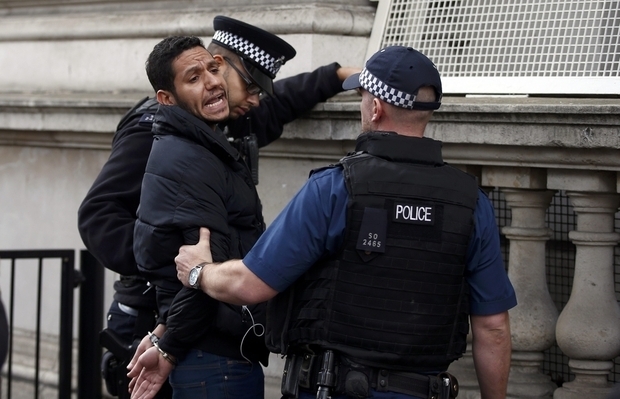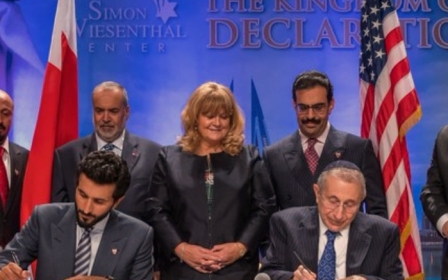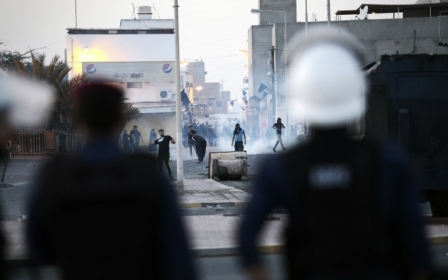'No torture in Bahraini prisons' claims UK-backed rights group

Rights groups have said a British-backed rights group in Bahrain is "utterly at odds with reality" after it claimed that there are no cases of torture in the country's notoriously brutal prison system.
The extraordinary claim by Bahrain's National Institute for Human Rights (NIHR), a body established with the British Foreign Office to investigate allegations of human rights abuses, comes as exclusive testimonies, seen by Middle East Eye, reveal fresh allegations of beatings, sleep deprivation and the use of dogs to attack prisoners in the Bahraini prison system.
It also comes as the Bahraini government has been accused of intensifying a year-long crackdown on the country's Shia Muslim majority that has seen opposition figures and journalists jailed.
Rights groups say torture is "endemic" in Bahrain, especially in the kingdom's death row and security prisons, and in testimonies gathered by London-based rights group Reprieve family members of death-row inmates describe prison guards at the notorious Jau prison "stomping" on inmates and using sleep deprivation tactics.
"They cannot even sleep," she said the wife of one death-row inmate. "The guards come at them in the middle of the night."
The evidence, gathered earlier this year, follows a recent report from Amnesty International which said that, in the year to June 2017, at least 169 critics of the Bahrain government or their relatives were arrested, tortured, threatened or banned from travel by the security forces.
The group also says it received reports of nine government critics being tortured in detention.
'No torture, no mistreatment'
However, at a press conference earlier this month, the chairman of the NIHR said there is "no systematic maltreatment of any kind in Bahrain's prisons".
Saeed al-Faihani added that a string of unannounced visits to prisons in the country had found no evidence of torture.
These claims were repeated on Tuesday when Simon Martin, the UK ambassador to Bahrain, met with NIHR to discuss rights reform, where he reportedly expressed "his appreciation" for the organisation and praised "positive steps" made in its monitoring of human rights.
Martin's support is unsurprising as NIHR was founded in 2012 amid UK pressure, and while it is not directly funded by London it receives training and support from the British government, prompting claims the UK is allowing Bahrain to "whitewash" allegations of rights abuses.
UK officials have met members of the NIHR at least 18 times since 2013 and 100 officials have travelled to the UK for training, under a scheme funded by the UK embassy in Bahrain, MEE understands.
Officials and media experts from NI-CO, a British-government backed NGO, have also met with the NIHR to give strategic communications advice. In December, a former BBC journalist and media consultant working with NI-CO and NIHR in Bahrain was killed in a car crash.
Despite diplomatic niceties from London's man in Bahrain this week, the NIHR has faced repeated criticism for failing to properly investigate allegations of torture from the international community.
The UN Committee Against Torture recently warned that NIHR and other UK-backed rights bodies in Bahrain are "not independent" and "not effective given that complaints ultimately pass through the Ministry of Interior".
Despite this, the Foreign Office has publicly insisted that the NIHR is "independent, effective and accountable" and rights group say British officials are doing little to raise human rights concerns with Manama.
Whitewashing of abuse
Maya Foa, director of Reprieve, told MEE: "It's shocking that a UK-trained body tasked with independent oversight of Bahrain's prisons is claiming that it has found no evidence of torture. These claims are utterly at odds with reality – just months ago, several torture victims were executed on the basis of forced 'confessions'."
Foa added: "The Foreign Office must urgently explain why it is vouching for a body that appears to be dedicated to whitewashing Bahrain's human rights abuses."
The recent NIHR claims came after visits to several woman-only prisons, according to reports in Bahrain state media, but it was unclear whether NIHR officials had also visited male prisons or the more sensitive security and death row units.
A spokesperson for the Bahrain embassy in London declined to comment on the NIHR or conditions in Bahrain's prison system, but instead referred MEE to a recent statement rebutting Amnesty International's recent claims and claiming officials had met with the NGO on numerous occasions to discuss allegations of abuse.
However Amnesty International has denied claims its staff have held regular meetings with Bahrain officials and called on the country to allow independent prison inspections.
The claim from the UK-trained body also comes after the Foreign Office was accused last week of "lending cover" to Bahrain's ongoing human rights crackdown, amid growing concern that Bahrain is retaliating against pro-democracy campaigners in the country and living in exile.
Amnesty International UK has expressed concern over the targeting of the family of a prominent critic of the government, Sayed Ahmed Alwadaei, who lives in exile in London.
Hours after Alwadaei took part a peaceful protest outside Downing Street during the UK visit of the Bahraini King Hamad bin Isa al-Khalifa last October, his wife and infant child in Bahrain were arrested, with his wife alleging she was mistreated and then threatened with criminal charges.
Political retribution?
Interrogators made specific reference to Alwadaei's protest in London, reportedly calling the government critic "an animal".
In March, other members of Alwadaei's family were arrested and are now facing serious criminal charges, apparently as a reprisal against Alwadaei's continued opposition activities in Britain.
Addressing concerns over the independence of the NIHR, Alwadaei, who serves as director of advocacy at the Bahrain Institute for Rights and Democracy (BIRD), told MEE: "The UK's increasing 'confidence' in the NIHR, which it helped to establish, suggests it supports deliberate misrepresentation of abuses.
"This whitewashing comes at a time when Bahraini security forces have intensified their grotesque use of torture – we're now even seeing cases involving the rape of detainees."
A Foreign Office spokesman said officials monitor the situation in Bahrain closely and "regularly raise concerns about human rights" with the Bahraini government.
He said: "The UK continues to support Bahraini-led reform through a package of technical assistance.
"We believe it is not good enough to criticise countries from the sidelines. Only by working with Bahrain can we bring about the changes we would like to see."
New MEE newsletter: Jerusalem Dispatch
Sign up to get the latest insights and analysis on Israel-Palestine, alongside Turkey Unpacked and other MEE newsletters
Middle East Eye delivers independent and unrivalled coverage and analysis of the Middle East, North Africa and beyond. To learn more about republishing this content and the associated fees, please fill out this form. More about MEE can be found here.





